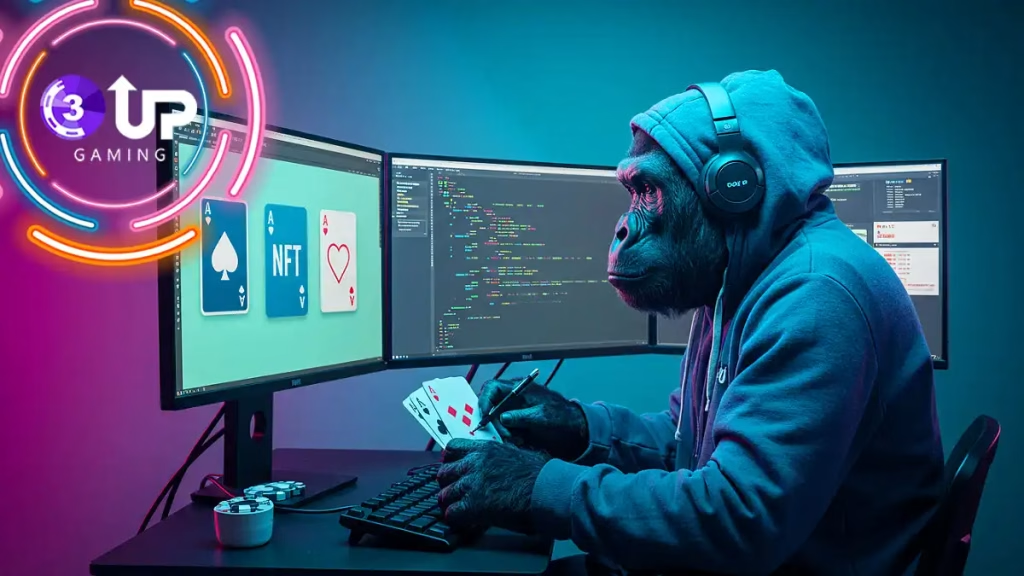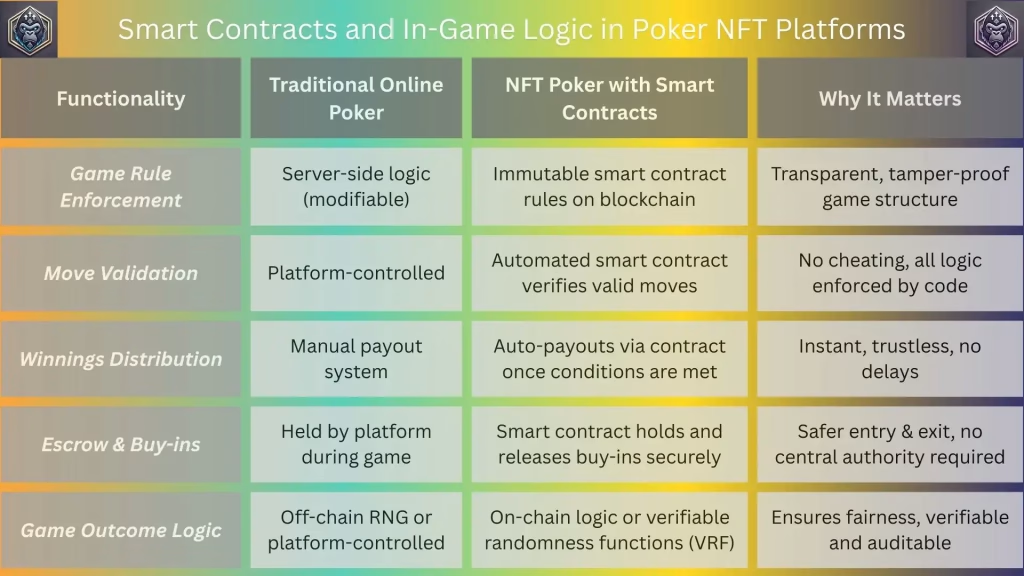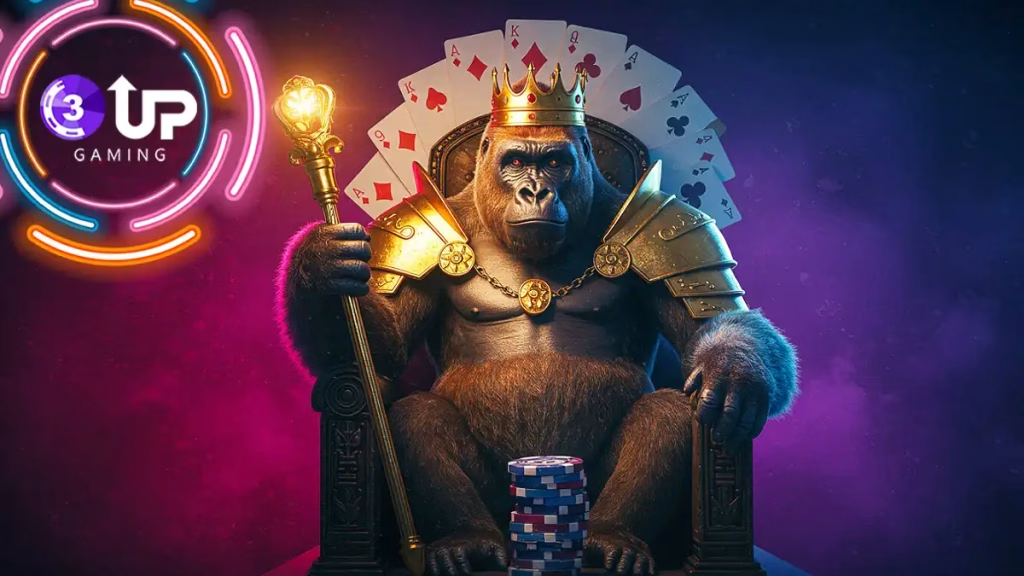Behind the Scenes: Poker NFT Gameplay Mechanics! Dive into the innovative world of Poker NFT gameplay mechanics, where blockchain technology meets strategic card play. Behind the scenes, smart contracts ensure fair dealing, while NFT-based cards provide true digital ownership and rarity. Each hand is securely recorded on the blockchain, preventing cheating and enabling full transparency.
Players can collect, trade, and upgrade their poker NFTs, adding a dynamic layer of strategy and personalization. This next-gen gaming experience blends classic poker skills with Web3 innovation, attracting both crypto enthusiasts and poker pros. Discover how these mechanics are reshaping online gaming in the decentralized era.
What Are Poker NFTs?
Poker NFTs are the fungible tokens of verifiable, unique assets of blockchain-based poker applications. Compared to traditional poker websites where the game proprietor owns all chips, cards, and avatars, Poker NFTs decentralize the game’s dimensions and control.
What this implies is that everything from the cards, table setups, avatars or even the seat selection can be tokenized as a separate asset of the player and not of the platform.
Based on blockchain networks such as Ethereum, Polygon or Solana, such NFTs can be seamlessly imported into poker ecosystems where they may be used in games, traded in marketplaces or even rented out for passive income with leasing or staking.
For instance, a Queen of Hearts NFT card may bestow prestige or in-game bonus skills, VIP avatar can bestow entry into participating in tournaments or rewards in-game.
In order to make sure that no two cards or characters are identical, these tokens have been created non-fungible. This imparts the uniqueness, collectibility, and individual investment to the poker enjoyment and the persistence and clarity of blockchain.
Apart from visual appearance Poker NFTs also usually have metadata that tracks win history, level of uniqueness or special powers, extending the possibilities of what poker online can do.
Overall, Poker NFTs are the building blocks for poker’s future; they are extremely customisable, interactive, and ownable.
Discover more about: Altcoin Poker Sites: Beyond Bitcoin for Your Poker Games!
Compare this with: Crypto Poker Software: Play with Bitcoin and Altcoins!
How NFT Integration Transforms Gameplay
Poker is changed by blockchain, not just digitized. NFTs bring real time asset ownership, custom playstyles and a more competitive, live atmosphere to the table. Here’s how NFTs change the table:

Real-Time Ownership
Your assets are rented in traditional online poker; the game provider’s backend owns your profile, chips, and cards. In NFT frameworks, assets are yours. When you do own a rare card skin, a legendary dealer avatar, or a premium table slot as an NFT, it is kept in your digital wallet and provable on-chain.
You are free to sell it, trade it, or even utilize it across supported poker games. Such live ownership gives players the chance to become stakeholders in the ecosystem, not just users.
Customizable Assets & Avatars
Poker NFT games tend to exceed the usual chip and table themes. Custom card backs, dealer environments, and fully animated figures can all be purchased and equipped as NFTs. These are not merely cosmetic enhancements; they can increase engagement, grant access to exclusive rooms, or impact game mechanics using layered metadata such as reputation scores or rarity labels.
Dynamic Decks
With NFTs event decks can change. In some games players can gather and build custom sets of cards with limited edition attributes or commemorated stats. This turns a fixed set of cards into a dynamic, collectible system that gives a strategic advantage to the gameplay. It also brings scarcity to the card ecosystem which creates more market value and collectible hype.
Take control with: 3UP Gaming’s Standalone Poker: Full Control & Customization!
Explore further: Buy Poker Software: The Best Platform for Your Investment!
Smart Contracts and In-Game Logic

The rules are the foundation of any poker game and in NFT poker sites, smart contracts instead of a server impose the rules. These pieces of blockchain code are executable and ensure the game is transparent, honest and unbreakable, so the outcome of the game is not just trustworthy but verifiable.
How Smart Contracts Redesign the Poker Table
Smart contracts are self executing agents that do rounds of bet, pot allocation, move checking and game over. Smart contracts eliminate backend tampering or hidden algorithms and open source logic that can be inspected by any player on the blockchain.
By applying these mechanics directly to the chain, smart contracts bypass middlemen and execute rules in a decentralized way. That’s how they bring in-game logic to current NFT poker platforms:

Self-executing blockchain code and smart contracts defining how games are conducted are the foundation of NFT poker. Such contracts provide trustless play, transparency and tamper evident enforcement of the rules of poker.
Immutable Rules
Once deployed smart contracts are unchangeable. The rules can’t be modified during a game by anyone including the developers themselves. It safeguards the system from cheating, biased advantage or sudden change, so all instances of play are uniform.
Player Action on Chain
Everything that happens in a poker game is written on a chain, including checks, calls, folds and raises. This creates a recordable history of action, so there is no ambiguity and conflicts can be resolved easily based on transparent evidence on the ledger.
Outcome Determination
The instant a hand is closed, the result is automatically and instantly decided by smart contracts. Human intervention or delay does not take place as chips are dispensed, the result is announced, and game history is maintained.
Card Ownership, Randomization & Fair Play
Any poker game is based on fairness, which in the world of NFTs is guaranteed by cryptographic proof and blockchain architecture rather than trust.

NFT-Based Card Identity
Each card in the game is minted or referenced as an NFT, so it’s a unique, verifiable asset. Players can own, trade or collect specific cards or full decks with cryptographic proof of ownership. That’s asset permanence never seen before in digital poker.
Fair Shuffling Protocols
On-chain shuffling uses provably fair algorithms like VRF (Verifiable Random Functions) or commit-reveal schemes. No one, including developers, can influence the card order. Every hand is randomized with mathematical fairness.
Auditable Game Logs
Every move, deal and outcome is recorded on-chain. Anyone can audit a past game, verify the shuffle, check card sequences or track win/loss stats. That’s fairness you can’t get with traditional platforms.
Choosing the right tool? A Real World Guide to Picking the Best Online Poker Platforms!
Search More: Poker Software for Sale: Launch Your Online Business!
Marketplace and Asset Trading Mechanics

One of the key features of poker NFT ecosystems is the player driven economy where you can buy, sell, rent or even lend your assets. Unlike traditional online poker platforms where your avatar or card skin is locked to your account, NFT based poker platforms tokenize these items so you have true on-chain ownership.
You can own unique poker tables, avatars of characters, chip sets or unique card backs, all with a token. These can be traded on mainstream NFT platforms like OpenSea, Blur or game shops via in-built wallets. Renting mechanics are also on the horizon where you’ll be able to rent high level assets for one-time events or tournaments.
This reduces the entry barrier and introduces liquidity to virtual game assets, the virtual equivalent of renting out virtual property or game skin in other Web3 games.
Multiplayer Dynamics and Cross-Platform Play
Ecosystem Interoperability
Poker NFT platforms are adopting interoperability, so you can carry your NFT assets with you wherever you are on other gaming platforms. An avatar that you purchase in one blockchain poker game can be used on a metaverse casino, or a different poker universe. These types of cross-game uses occur through common NFT standards such as ERC-721 or ERC-1155 and smart contracts that prove ownership across apps.
This gives value to the NFT assets, so your high-risk poker gorilla avatar has game or social advantages above a single system.
Cross-Device Experience
With the need for accessibility on the rise, these games are being built for desktop, mobile and VR. Wallet integrations via MetaMask, WalletConnect or proprietary mobile SDKs ensure a seamless experience. Whether you’re using a phone on Solana or a PC on Ethereum, your poker NFTs come with you.
And with cross-chain bridges on the rise, more platforms are offering asset migration between chains, so you can play anytime, anywhere, without losing your deck or game state.
Learn the difference: Top 10 Crypto Poker Platforms in 2025: Unbiased Reviews
Compare this with: Top Online Poker Software Developers: Custom Solutions for Real Money & Social Gaming!
Security, Gas Fees, and Blockchain Choices
Security and user-friendliness at poker NFT platforms rely heavily on their blockchain technology; pay a premium for bulletproof. Here’s how they do it:
Gas and Efficiency
Each action, whether a raise or a fold, can be paid in microtransactions if done on-chain.
Platforms fight back by:
- Using layer-2 solutions (e.g., Polygon, Arbitrum) to reduce fees by a massive percentage.
- Having off-chain game state and only the most important results in on-chain.
Certain games employ rollups or batch processing to minimize user-side gas usage in heavy multiplayer sessions.
Chains for Choice of Poker
The most popular chains that can support poker NFTs are:
- Ethereum – the original, proven and reliable but expensive.
- Polygon – popular because it is fast and cheap, ideal for users on mobile.
- Solana – provides speed and cheap gaming and is popular for NFT stores.
- Immutable X – growing in popularity with gasless trade, designed for games.
They are also mostly multi-chain, and the user can play in their preferred environment through bridges.
Smart Contract Audits
For fairness and security, smart contracts need to be thoroughly audited.
Good poker sites:
- Partner with companies like CertiK, OpenZeppelin or Trail of Bits.
- Publish audit reports to get player trust.
- Have bug bounty programs and patch code regularly to prevent exploits or gameplay manipulation.
Strong blockchain design, strict auditing and low cost infrastructure = NFT poker is a secure and agile space for modern players.
Learn how to set it up: How to Buy a Profitable Poker Site? Complete Guide!
Understand the logic: Can Poker Bots Beat Human Professionals?
The Future of Poker NFT Gameplay

As blockchain gaming grows, Poker NFT gameplay will be at the forefront of the next wave of tech, combining experiences and mechanics. Here’s a sneak peek at what’s to come and what’s next:
AI NFTs
- Next gen Poker NFTs will learn from play, with avatars adapting their behavior, style and even persona.
- Train AI companions that give you tips, mimic legendary poker plays or play on auto-mode while you play loose.
- Dynamic difficulty adjustment based on your win/loss streak will increase competition and engagement.
AR/VR Integration
- Look for metaverse poker salons where you can sit down at a 3D table, watch avatars react, and interpret body language cues, all in virtual.
- NFT characters will have facial animation packs, wearables, or even voice packs, bringing new depths of immersion.
- Cross-platform compatibility for AR glasses and VR headsets supports joinability from headsets, phones, or desktops with ease.
Dynamic Cards and Rule Mods
- Subsequently, decks can even be NFT-based in order to allow for theme decks (such as “Cyberpunk Flush” or “Jungle Royale”) that alter the look and sound effects of play.
- User-created rulesets stored in NFTs can even be supported by a number of platforms, allowing for such formats as mystery rounds, speed poker, or all-in battles.
- Developers can add season rarity mechanics, where cards change, degenerate, or transform shape depending on time or events.
Playing tomorrow isn’t so much playing poker as it is experiencing it. With the NFTs as the base, gaming, collecting, and storytelling already meet in one experience that will be remembered.
Want smarter decisions? Real Money Poker: A Complete Overview of Legal, Operational, and Tactical Aspects!
FAQs: Poker NFT Gameplay Mechanics
1. What makes Poker NFT gameplay different from traditional online poker?
Unlike other platforms, Poker NFTs combine digital ownership so you can own avatars, cards and even tables. Blockchain brings transparency, fairness and traceability to all bets, actions or shuffles so social games are ownable and collectible.
2. Are Poker NFTs just cosmetic or do they affect gameplay?
Some NFTs are just decorative, others add utility: they change game worlds, give access to exclusive tournaments or even control bluff styles and animations. Wait for more embedded applications where NFTs drive strategy, psychology and rewards down the line.
3. Can I earn or sell my poker NFTs after gameplay?
Yes. You can sell, trade or lease your poker NFTs on multiple platforms. Some reward players with crypto payouts or NFT drops as winnings or for participating in tournaments. Your game achievements become an investable asset with real world monetary value.
4. Is Poker NFT gameplay provably fair and secure?
Yes. Smart contracts and on-chain shufflings make blockchain based platforms able to make every move tamper proof and verifiable. Players can check records of gameplay for fairness which is better than the current poker system where back-end algorithms are unknown.
5. What blockchains support Poker NFT games in 2025?
Ethereum, Polygon, Solana and Immutable X are popular NFT options for gaming. Each has its own features like security, scalability, low gas fee, lightning fast gameplay and community exposure depending on the game needs.
6. Do I need crypto knowledge to play Poker NFT games?
Not exactly. Most sites are building simple onboarding mechanisms including fiat on-ramping, wallet connection and tutorial training. A basic understanding of wallets, gas charges and trading will help the gamer to learn and make the most of it.


